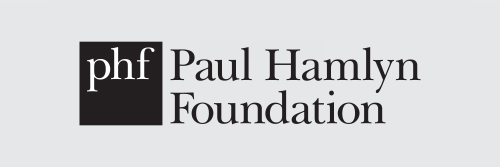National Pavilion of Ukraine @ Venice Biennale
20 April - 24 November 2024
The National Pavilion of Ukraine displays the exhibition Net Making, and focuses on the process of joint work and co-creation. Net Making pays homage to the collective action shown by Ukrainian citizens in the ongoing conflict against Russian aggression, in weaving camouflage nets used to deflect attacks. Open Eye Gallery is delighted to be supporting the National Pavilion of Ukraine at the 60th Venice Biennale, co-curated by our curator, Max Gorbatskyi, together with the curator of our Home: Ukrainian Photography, UK Words exhibition tour, Viktoria Bavykina.
Sitting within the Arsenale, the exhibition is cocooned within a textile wall made from woven flax and hemp fabric, a traditionally domestically produced material from Ukraine. This is Work by Oleksandr Burlaka, one of the six contributing artists featured in the pavilion. Each artist has interacted with diverse communities in a different way, with the four artworks offering different possibilities for talking about shared experiences and various approaches to collectivity and interaction with others.
“The weaving of nets is a symbolic and, simultaneously, a very real embodiment of horizontal organisation and collective action. As direct action it forms protection of Ukrainian fighters and deception of the enemy, yet net weaving has also turned into a group therapeutic practice which offers a sense of belonging. This […] dulls the feeling of guilt that haunts all Ukrainians. [T]he project of the National Pavilion of Ukraine, fragment by fragment, gathers various experiences of otherness, experiences that are complex and controversial, requiring preservation and articulation. This Net Making project is about forging connections in times of crisis and attaining the strength to speak through unity with others.
Profoundly traumatic and violent experiences, particularly those associated with war, move a person into the category of ‘other’ in the eyes of those who exist outside of these experiences. Attempts to articulate them appear challenging and painful, and perception is almost impossible for those who have not directly encountered such. The media may be good at displaying information but limited at communicating complex individual experiences. Artistic practices are an essential alternative: here, the bearers of experience can turn into co-authors and form expressions themselves.” – Max Gorbatskyi & Viktoria Bavykina
Net Making artists and artworks:
Andrii Dostliev, Lia Dostlieva, Comfort Work (2023–2024)
Ten actors from the EU and the UK were hired by the artists to portray ‘favourable’ types of Ukrainian refugees. Furthermore, actual Ukrainian refugees who had contributed to the research on stereotypes about them, were invited to coordinate and help improve the actors’ performances. The videos were specifically created with a European viewer in mind who might be comforted by seeing a selection of what has been determined as ‘comfortable’ refugees. Filmed in Liverpool in Open Eye Gallery. Meet the team behind this project in an article by The Guardian.
Katya Buchatska, Best Wishes (2022–2024)
Together with Anastasia Averina, Heorhii Alaverdov (Chef Georgy), Iryna Holoborod’ko, Yevhen Holubentsev, Oleksii Denysenko, Vlada Dyka, Olya Zholobetska, Nastya Kravchuk, Daryna Malyuk, Oleksii Ovdiienko, Artem Oliinyk, Valentyn Radchenko, Anna Sapon, Oleksandr Steshenko, Varya Shyshlova
This project is about rethinking the traditions of greetings and wishes and was co-created with neurodiverse artists. For eight years, Katya Buchachka has been working in an inclusive art workshop in Kyiv. In the first week of Russia’s full-scale invasion of Ukraine, together with her colleague Olha Shishlova, they decided to renew the classes and make them daily. These meetings laid the first ideas for the ‘Best Wishes’ project.
The free interpretation of conventional language by neurodiverse people has always interested the artist, but thanks to regular online meetings at the time of catastrophe, she scrutinised this intense language even more closely. Formalised and simultaneously aspired statements have further redefined the social reality.
Oleksandr Burlaka, Work (2024)
Connecting three interwoven artworks, the textile wall is made of dozens of sheets of homemade fabric dating back to the 1950s and 1960s, sourced from diverse regions across Ukraine. This kind of fabric, often retained and still owned by many families, represents the last link in the traditional home production of flax and hemp. The days and hours spent in repetitive work were the formalisation of hope for the future and care about the ones who will live after. At the same time, weaving can become a therapeutic collective practice, aiding individuals in navigating challenging times.
Andrii Rachynskyi, Daniil Revkovskyi, Civilians. Invasion (2023)
The artists used the familiar for their practice method of looking for materials through search algorithms in social networks. They collected archival videos from open sources recorded by civilians during the full-scale invasion of Russia in Ukraine.
Searching for materials by the names of cities and towns and by keywords such as “shelling”, “burial”, etc., the artists viewed several thousand videos. With the beginning of a full-scale invasion, the content on ordinary private accounts changed: staying in basements, evacuating from occupied territories, and trying to survive. On some of these channels, the last videos were uploaded in March-April 2023, and they were no longer updated. The fate of the authors of these channels is unknown.
Image: Rob Battersby
The National Pavilion of Ukraine displays the exhibition Net Making, and focuses on the process of joint work and co-creation. Net Making pays homage to the collective action shown by Ukrainian citizens in the ongoing conflict against Russian aggression, in weaving camouflage nets used to deflect attacks. Open Eye Gallery is delighted to be supporting the National Pavilion of Ukraine at the 60th Venice Biennale, co-curated by our curator, Max Gorbatskyi, together with the curator of our Home: Ukrainian Photography, UK Words exhibition tour, Viktoria Bavykina.
Sitting within the Arsenale, the exhibition is cocooned within a textile wall made from woven flax and hemp fabric, a traditionally domestically produced material from Ukraine. This is Work by Oleksandr Burlaka, one of the six contributing artists featured in the pavilion. Each artist has interacted with diverse communities in a different way, with the four artworks offering different possibilities for talking about shared experiences and various approaches to collectivity and interaction with others.
“The weaving of nets is a symbolic and, simultaneously, a very real embodiment of horizontal organisation and collective action. As direct action it forms protection of Ukrainian fighters and deception of the enemy, yet net weaving has also turned into a group therapeutic practice which offers a sense of belonging. This […] dulls the feeling of guilt that haunts all Ukrainians. [T]he project of the National Pavilion of Ukraine, fragment by fragment, gathers various experiences of otherness, experiences that are complex and controversial, requiring preservation and articulation. This Net Making project is about forging connections in times of crisis and attaining the strength to speak through unity with others.
Profoundly traumatic and violent experiences, particularly those associated with war, move a person into the category of ‘other’ in the eyes of those who exist outside of these experiences. Attempts to articulate them appear challenging and painful, and perception is almost impossible for those who have not directly encountered such. The media may be good at displaying information but limited at communicating complex individual experiences. Artistic practices are an essential alternative: here, the bearers of experience can turn into co-authors and form expressions themselves.” – Max Gorbatskyi & Viktoria Bavykina
Net Making artists and artworks:
Andrii Dostliev, Lia Dostlieva, Comfort Work (2023–2024)
Ten actors from the EU and the UK were hired by the artists to portray ‘favourable’ types of Ukrainian refugees. Furthermore, actual Ukrainian refugees who had contributed to the research on stereotypes about them, were invited to coordinate and help improve the actors’ performances. The videos were specifically created with a European viewer in mind who might be comforted by seeing a selection of what has been determined as ‘comfortable’ refugees. Filmed in Liverpool in Open Eye Gallery. Meet the team behind this project in an article by The Guardian.
Katya Buchatska, Best Wishes (2022–2024)
Together with Anastasia Averina, Heorhii Alaverdov (Chef Georgy), Iryna Holoborod’ko, Yevhen Holubentsev, Oleksii Denysenko, Vlada Dyka, Olya Zholobetska, Nastya Kravchuk, Daryna Malyuk, Oleksii Ovdiienko, Artem Oliinyk, Valentyn Radchenko, Anna Sapon, Oleksandr Steshenko, Varya Shyshlova
This project is about rethinking the traditions of greetings and wishes and was co-created with neurodiverse artists. For eight years, Katya Buchachka has been working in an inclusive art workshop in Kyiv. In the first week of Russia’s full-scale invasion of Ukraine, together with her colleague Olha Shishlova, they decided to renew the classes and make them daily. These meetings laid the first ideas for the ‘Best Wishes’ project.
The free interpretation of conventional language by neurodiverse people has always interested the artist, but thanks to regular online meetings at the time of catastrophe, she scrutinised this intense language even more closely. Formalised and simultaneously aspired statements have further redefined the social reality.
Oleksandr Burlaka, Work (2024)
Connecting three interwoven artworks, the textile wall is made of dozens of sheets of homemade fabric dating back to the 1950s and 1960s, sourced from diverse regions across Ukraine. This kind of fabric, often retained and still owned by many families, represents the last link in the traditional home production of flax and hemp. The days and hours spent in repetitive work were the formalisation of hope for the future and care about the ones who will live after. At the same time, weaving can become a therapeutic collective practice, aiding individuals in navigating challenging times.
Andrii Rachynskyi, Daniil Revkovskyi, Civilians. Invasion (2023)
The artists used the familiar for their practice method of looking for materials through search algorithms in social networks. They collected archival videos from open sources recorded by civilians during the full-scale invasion of Russia in Ukraine.
Searching for materials by the names of cities and towns and by keywords such as “shelling”, “burial”, etc., the artists viewed several thousand videos. With the beginning of a full-scale invasion, the content on ordinary private accounts changed: staying in basements, evacuating from occupied territories, and trying to survive. On some of these channels, the last videos were uploaded in March-April 2023, and they were no longer updated. The fate of the authors of these channels is unknown.
Image: Rob Battersby

